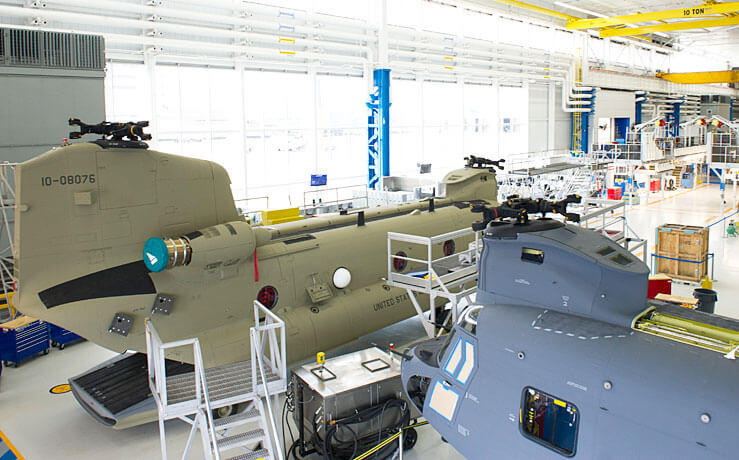Boeing will close its manufacturing facility outside Philadelphia, Pennsylvania, for a two-week deep clean of its rotorcraft production lines after employees tested positive for COVID-19.

At close of business on Friday, April 3, the factory will temporarily suspend production “in light of the company’s continuous assessment of the spread of COVID-19 in the region,” Boeing said in a statement April 2.
“Suspending operations at our vital military rotorcraft facilities is a serious step, but a necessary one for the health and safety of our employees and their communities,” said Steve Parker, Boeing’s vertical lift vice president and general manager and Philadelphia site senior executive. “We’re working closely with government and public health officials in the tri-state region. We’re also in contact with our customers, suppliers and other stakeholders affected by this temporary suspension as we assist in the national effort to combat the spread of COVID-19.”
The factory is a major hub of military rotorcraft manufacturing where Boeing builds the H-47 Chinook for the U.S. Army and international customers. The company builds the fuselage and performs post-combat refit for the V-22 Osprey there. Boeing also installs military specific equipment and finalizes assembly of the Air Force’s new MH-139 Grey Wolf, built across town by Leonardo Helicopters.
Boeing is the first major U.S. Army helicopter manufacturer to shutter a production line because of the ongoing coronavirus pandemic. Army aviation leaders recently told reporters that prime contractors showed no signs of disruption and that the economic viability of sub-tier suppliers was the real worry.
As a holder of major U.S. government weapon contracts, Boeing is considered a critical infrastructure business by the Defense and Homeland Security departments and therefore expected to remain open.
Boeing promised “an orderly shutdown consistent with requirements of U.S. and global defense customers. . . . “We are working to minimize the suspension’s impact on the company’s ability to deliver and support critical defense programs.”
Boeing plans to have the facility back up and running by April 20. During the suspension, Boeing will continue to monitor government guidance and actions on COVID-19 and associated impacts on company operations. The company will conduct additional deep cleaning activities at buildings across the site and establish rigorous criteria for return to work.
More than 4,600 Boeing employees work in Pennsylvania, predominantly at the Philadelphia site. Philadelphia-area employees who can work from home will continue to do so. Those who cannot work remotely will receive paid leave for the 10 working days — double the normal company policy, according to a company spokesperson.
“We have had positive test results for Boeing Philadelphia employees, but we are not commenting further on any affected employees to ensure privacy,” a company spokesperson told Vertical. “This action is intended to ensure the well-being of employees, their families and local communities.”
Some good news emerged April 3, as Boeing announced delivery of the first of 20 CH-47F Chinooks to the Royal Netherlands Air Force. The Netherlands currently flies a mix of F-model and D-model Chinooks.
Its 20 new CH-47F Chinooks will be equipped with the same technology as the U.S. Army’s version, including digital automatic flight controls, a fully-integrated Common Avionics Architecture System (CAAS) glass cockpit, and advanced cargo handling capabilities. Deliveries are expected to continue into 2021.
“The RNLAF made it clear to us that they need the advanced, proven capability of the CH-47F now,” said Andy Builta, vice president of Cargo & Utility Helicopters and H-47 program manager. “I want to thank our phenomenal team for working hard during a difficult situation to safely deliver these aircraft.”









